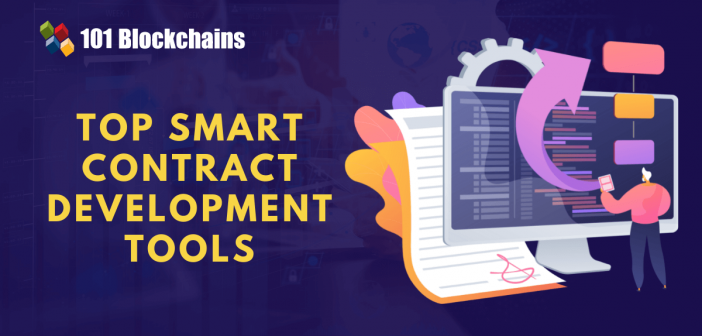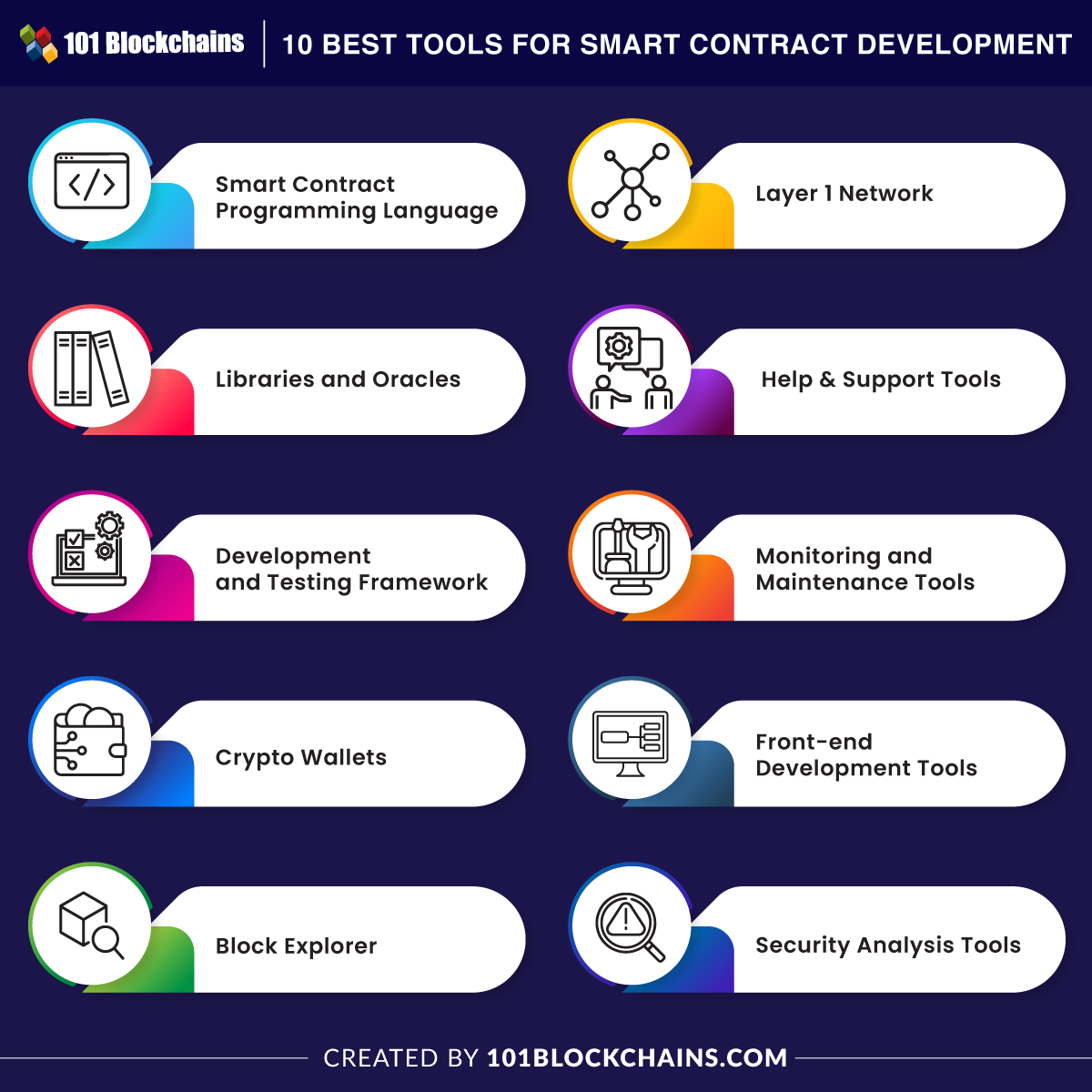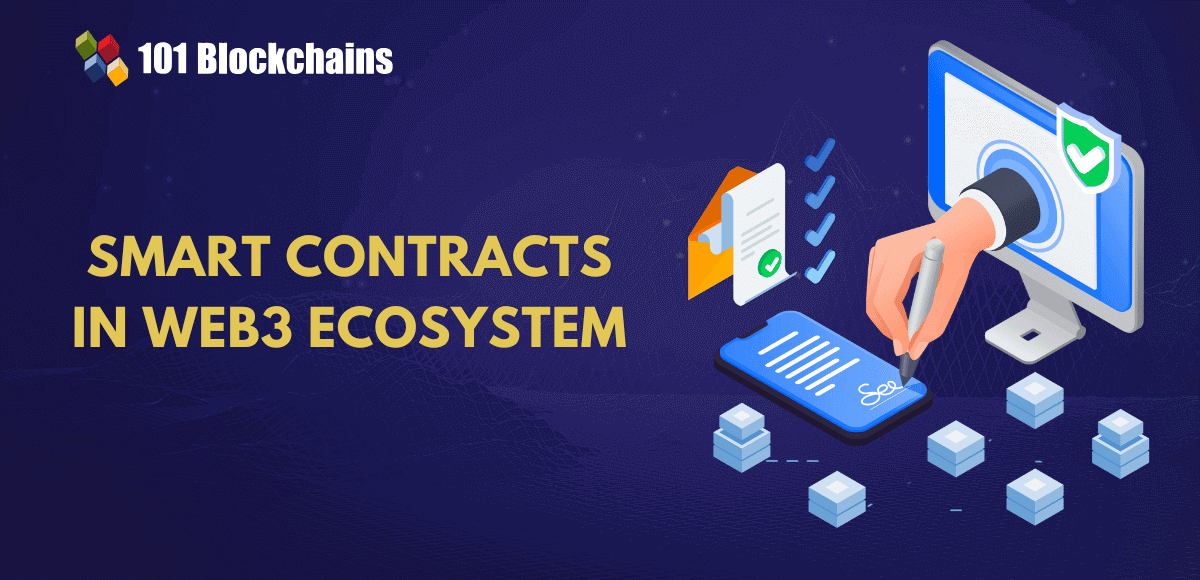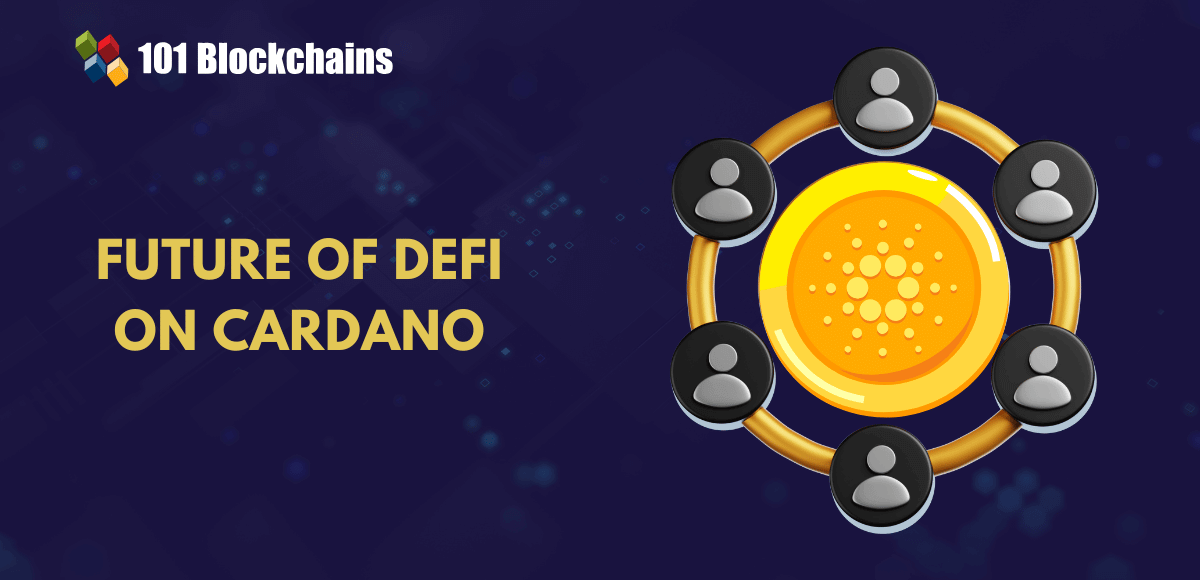Learn how blockchain truly works, master key definitions, and uncover what makes smart contracts so "smart." Dive into the fundamentals, gain valuable insights, and start your blockchain journey today!

- Solidity & Smart Contracts
James Howell
- on August 10, 2022
10 Best Tools for Smart Contract Development
Smart contracts are one of the biggest revolutionary interventions you can find in the present times. They have helped in introducing easier automation of different business processes and applications operating on a decentralized network. The interest in the best smart contract development tools has been increasing profoundly in recent times. Smart contracts have the capability to reduce administrative overhead, thereby serving as one of the prominent highlights of blockchain technology.
You don’t have to worry about any complicated technology terms when you think of smart contracts. They are basically programs on a blockchain network that run according to compliance with specific predefined conditions. The following discussion offers you a unique take on the top smart contract development tools to help you build your skills for developing smart contracts and decentralized applications.
Curious to understand the complete smart contract development lifecycle? Enroll now in Smart Contracts Development Course Now!
Essential Smart Contract Development Tools You Need
The growth in popularity of smart contracts has pushed the creation of many new tools for developing smart contracts. As a matter of fact, it is quite difficult to rank a few tools in the top ten list when you need multiple tools for building a smart contract. Therefore, it is important to look at the categories of essential smart contract tools and the examples in each category. Here is an outline of the most important smart contract development tools you would need in 2022.

1. Smart Contract Programming Language
The foremost entry among important smart contract developer tools would point at the programming language for creating the smart contract code. Interestingly, you can find many popular smart contract programming languages suited to your preferences. The top choices in programming languages for smart contract development include Solidity, Rust, and Vyper.
Solidity is the most commonly used programming language for smart contract development. It works on all the popular smart contract development platforms such as Avalanche, Ethereum, Polygon, and others. Solidity has been tailored for Ethereum Virtual Machine, and any blockchain network compatible with EVM can support the use of Solidity for smart contract development.
The list of smart contract development tools in programming languages also includes Vyper. It also offers EVM compatibility and is popular for being the primary language of the Curve Finance DeFi platform. On the other hand, another recent addition among smart contract programming languages, Rust, has been taking a different route. Rust provides the flexibility for deploying to blockchain networks such as Terra, Polkadot, and Solana.
Wondering about which is the best language for your smart contract? Checkout guide on Top 5 Programming Languages To Build Smart Contracts now!
2. Libraries and Oracles
The discussion on the best smart contract development tools would also draw attention to libraries and oracles. These tools are essential for incorporating the special functionalities you need in a smart contract. For example, libraries can help in adding new dApps, while oracles can help in obtaining information required to execute smart contracts.
The best blockchain oracle for smart contract development is ChainLink, which helps smart contracts turn into hybrid smart contracts. With the facility for including an off-chain component and connection with the real world, the smart contract could achieve better functionality. Almost 50% of smart contracts leverage oracles as an important highlight in their infrastructure.
On the other hand, smart contract tools such as libraries like OpenZeppelin are also important requirements for all developers. OpenZeppelin is the standard library for Solidity programming language and features packages for multiple functionalities. You can use OpenZeppelin packages for deploying NFTs, DAOs, or upgradable contracts, thereby adding new functions to your smart contracts.
Build your identity as a certified blockchain expert with 101 Blockchains’ Blockchain Certifications designed to provide enhanced career prospects.
3. Development and Testing Framework
The next critical addition among top smart contract development tools is the development and testing frameworks. These frameworks are a mandatory part of the journey of every developer. The development and testing frameworks offer great support in deploying and testing smart contracts efficiently.
Interestingly, you can find many promising options among development and testing frameworks such as Hardhat, Truffle, and Remix. These three frameworks are the popular choices of developers for creating, compiling, testing, and deploying smart contracts. You can explore distinct features in each framework suited for making the process of testing and deploying smart contracts a lot easier.
You can also come across some of the alternative options in the development and testing frameworks for smart contracts, such as Waffle, Embark, and web3j. In addition, you can also find smart contract development and testing frameworks without EVM support, such as TerraSDK and Anchor.
Are you aspiring to learn the fundamentals of the Ethereum Virtual Machine and smart contracts’ upgradability? Enroll now in the Advanced Solidity Development Course.
4. Crypto Wallets
The wallet is another important requirement among essential smart contract developer tools as it helps in storing the funds. It helps in storing and managing your testnet funds easily during the smart contract development and testing process. Developers can opt for a combination of different crypto wallets for their smart contract development project.
The most popular crypto wallet for smart contract developers refers to Metamask, which almost every crypto user knows. It is a hot wallet with the advantage of easier and flexible access to your funds. However, such wallets present the risk of losing your funds if the private key is compromised in any situation.
The list of smart contract development tools also includes options like Gnosis Safe and Ledger or Trezor. Gnosis Safe is a popular multi-sig wallet and offers a secure option for safeguarding your funds during the smart contract development process. Another plausible option for storing and managing your testnet funds would refer to cold wallets such as Ledger or Trezor.
Although you might have to go through many complicated steps for using cold wallets, they provide better assurance of security. Above everything else, you can always try a combination of hot wallets, multi-signature wallets, and cold wallets for secure management of your funds.
5. Block Explorer
The entries among top smart contract development tools would also include block explorers. Developers need block explorers for viewing transactions and monitoring their status. One of the most popular examples of a block explorer for smart contract developers is Etherscan, a free blockchain explorer. It features many in-built services and is easily the biggest block explorer for the Ethereum community.
Furthermore, Etherscan also supports projects on Binance Smart Chain and Polygon networks, thereby proving its reach. The examples of smart contract tools in the category of block explorers would also include Ethplorer and Etherchain. Both the competitors to Etherscan are lighter and have come up with some new and distinctive features.
Enroll now in the Certified Web3 Blockchain Developer Certification to learn about the best practices for writing, testing, and deploying Solidity smart contracts for web3 apps
6. Layer 1 Network
The outline of the best smart contract development tools might remain incomplete without mentioning the layer 1 networks. Why do you need a layer 1 blockchain for smart contract development? For example, if you have to transfer a transaction across the Ethereum blockchain, you must have a layer 1 blockchain for sending the transaction to an ETH node. Generally, Metamask and other popular crypto wallets come with background connections to layer 1 nodes. The popular examples of layer 1 blockchain networks suitable for smart contract development include Alchemy, QuickNode, and Infura.
Alchemy is one of the popular smart contract developer tools in layer 1 networks. It is one of the preferred choices of developers for ETH and EVM connections with an interesting and easy-to-use UI. Alchemy also offers a diverse collection of responsive layer 1 networks along with great client support.
7. Help & Support Tools
The journey of a smart contract developer would come across certain setbacks from time to time. In such cases, the top smart contract development tools for help and support could help developers overcome their obstacles. All developers must include help & support tools in their roadmap to ensure the best results from their project.
The two most readily available platforms for solving developer setbacks include Stack Exchange ETH and StackOverflow. Developers can also rely on Discord communities to find answers to their questions. However, Discord is more suited for discussions about new ideas for smart contract development. On the other hand, forums are great platforms for support as they facilitate indexing and ranking for queries.
8. Monitoring and Maintenance Tools
The list of smart contract tools in 2022 would also bring monitoring and maintenance tools under the limelight. In most cases, developers opt for using their own scripts for monitoring. On the other hand, popular tools such as Tenderly and Defender by OpenZeppelin can ensure promising improvements in efficiency for developers. Both the tools offer effective results in monitoring production code alongside ensuring their safety.
Want to know the real-world examples of smart contracts and understand how you can use it for your business? Check the presentation Now on Examples Of Smart Contracts
9. Front-end Development Tools
The smart contract-based application is only effective if people can use the application. Therefore, front-end development tools are important to ensure a flexible and efficient smart contract development project. The common tools such as CSS, HTML, JavaScript, and frameworks such as Angular or React are mandatory additions to the plan of developers.
On the other hand, front-end development tools help you envision and improve new functionalities for your smart contract applications. The examples of front-end development tools in the list of smart contract development tools would include Drizzle, UseDapp, and Ethers.js or Web3.js. Drizzle belongs to the Truffle Suite and offers an interesting collection of front-end tools. On the other hand, Web3.js and Ethers.js have evolved into popular JavaScript frameworks for defining smart contract front-end functionalities.
Want to explore an in-depth understanding of security threats in DeFi projects? Enroll in the DeFi Security Fundamentals Course Now!
10. Security Analysis Tools
The outline of essential smart contract developer tools would also include security analysis tools. Developers must understand that audits are critical necessities before releasing code to the blockchain network. Therefore, security analysis tools help in identifying the vulnerabilities in your application before you release it into production.
While due diligence on the part of developers is essential, new tools for smart contract development have introduced features for improving the security of your smart contracts. The notable examples of security analysis tools for smart contract development include MythX, Manticore, and Slither. MythX serves as a favorable tool for cloud-based bug testing, while Slither works effectively for static analysis procedures.
Start learning Blockchain with World’s first Blockchain Career Paths with quality resources tailored by industry experts Now!
Bottom Line
The different categories of best smart contract development tools show what you need to build a smart contract. What would you do with a list of top tools which has only smart contract programming languages and testing frameworks? The outline of different essential tools such as libraries and oracles, security analysis tools, front-end development tools, and help & support tools presents effective insights.
You can use the different tools in each category according to your development objectives. The biggest highlight of the discussion on top tools for smart contract development is that you can identify every requirement in your development plan. Learn more about smart contract development with a professional course to level up your career.
*Disclaimer: The article should not be taken as, and is not intended to provide any investment advice. Claims made in this article do not constitute investment advice and should not be taken as such. 101 Blockchains shall not be responsible for any loss sustained by any person who relies on this article. Do your own research!





